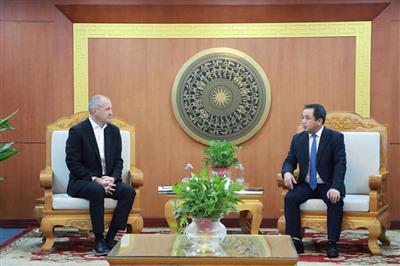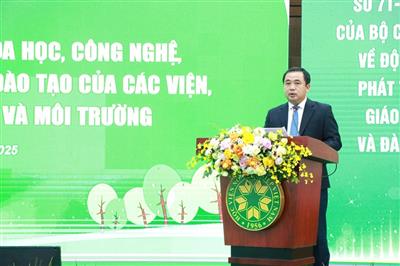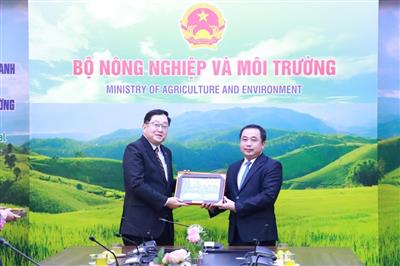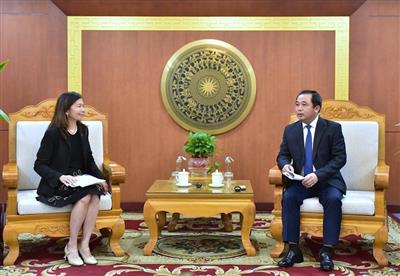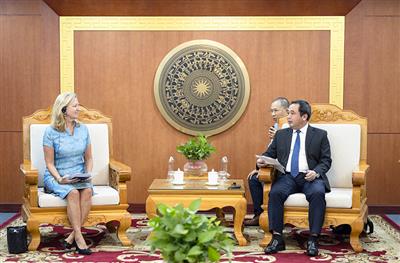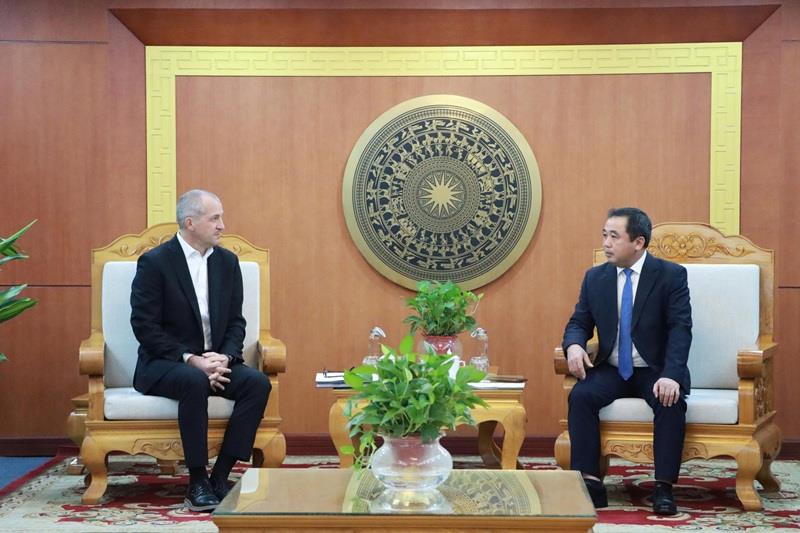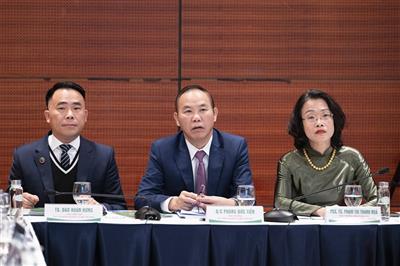
AMME-18: ASEAN strengthens common voice, Vietnam advances green development commitments
05/09/2025TN&MTThe 18th ASEAN Ministerial Meeting on the Environment (AMME-18), held in Langkawi, Malaysia, reaffirmed the region’s collective determination to address climate change, protect biodiversity, and promote sustainable development. With the participation of the Vietnamese delegation led by Deputy Minister of Agriculture and Environment Le Cong Thanh, the meeting recorded several important initiatives, in which Vietnam emphasized its principle of not trading the environment for growth, and was recognized for outstanding achievements in heritage conservation and green urban development.
AMME-18 confronts climate change and pollution
AMME-18 and related meetings took place from September 3–4, 2025, against the backdrop of growing environmental pressures in Southeast Asia. The region is considered among the world’s most climate-vulnerable, with potential economic losses projected to reduce GDP by 11–14% by the end of the century if global temperatures rise by 3–4°C.
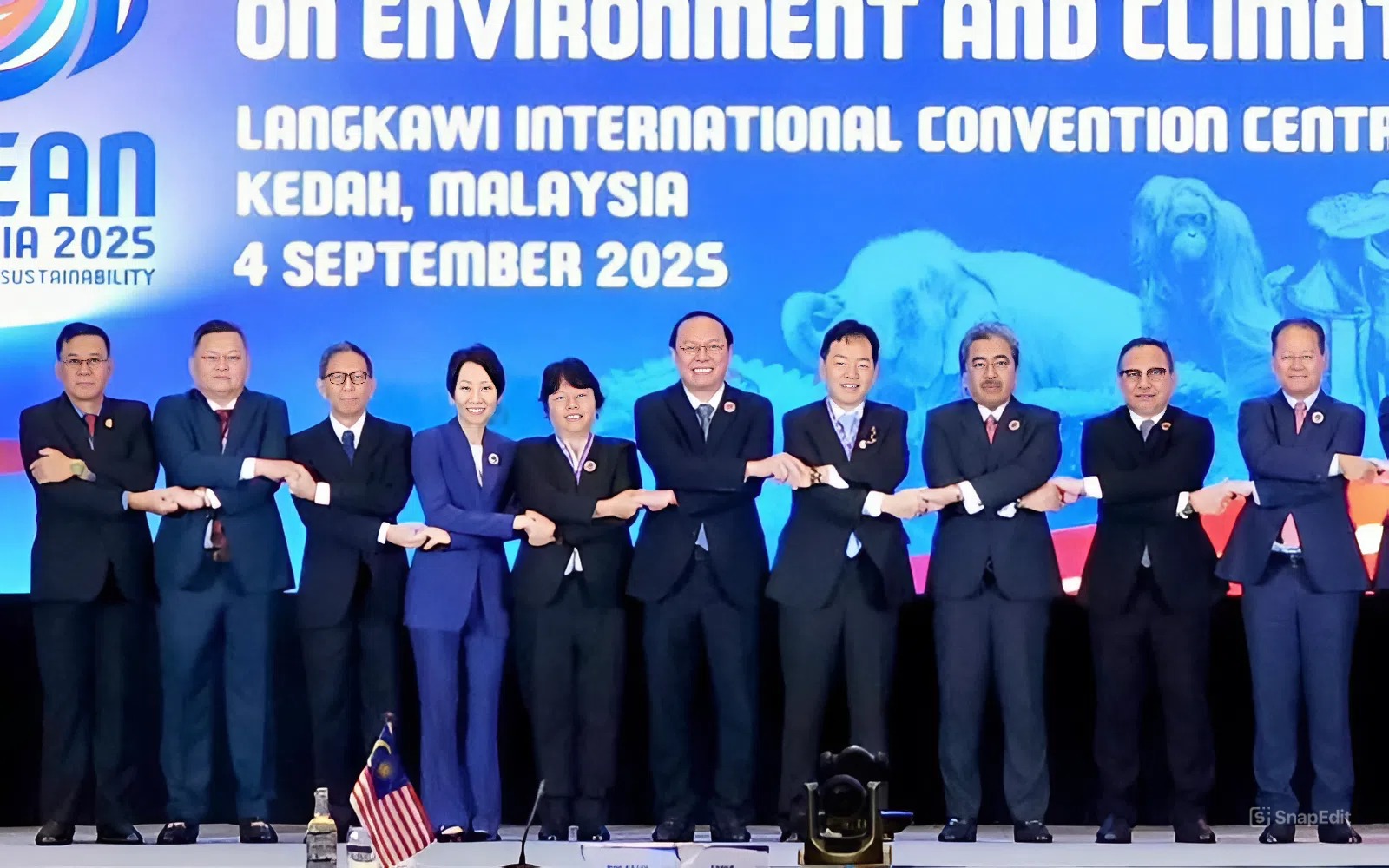
ASEAN sets five key priorities ahead of COP30, urging stronger financial commitments as the annual $300 billion NCQG target falls short of the projected $422 billion need by 2030 (Photo: NRESMALAYSIA)
In the opening session, Malaysia’s Acting Minister of Natural Resources and Environmental Sustainability, Johari Abdul Ghani, highlighted three priorities: strengthening regional cooperation, building a unified position ahead of the 30th UN Climate Change Conference of the Parties (COP30), and advancing the implementation of key international agreements such as the Paris Agreement, the Kunming–Montreal Global Biodiversity Framework, and the Global Plastics Treaty. He urged ASEAN member states to “speak with one voice” to safeguard common interests in global forums.
Malaysia also proposed the establishment of a Southeast Asia (SEA) Alliance, a dedicated negotiating bloc under the UNFCCC to complement ASEAN’s participation in the G77 and China. This was seen as a strategic step to enhance the region’s standing and shape the global climate agenda.
The AMME-18 Joint Statement underscored the urgency of climate action, setting five priorities ahead of COP30, including the completion of negotiations on the Global Goal on Adaptation (GGA), stronger mobilization of green finance, full operationalization of the Loss and Damage Fund, and progress on a regional carbon framework. While the new collective quantified goal (NCQG) on climate finance has only reached a pledge of USD 300 billion annually, ASEAN’s actual needs are estimated at USD 422 billion by 2030. According to the Ministers, this gap can only be bridged by mobilizing diverse public–private sources and reforming global financing mechanisms.
ASEAN Secretary-General Kao Kim Hourn also revisited the long-standing issue of transboundary haze pollution, a challenge persisting for more than two decades with serious health, economic, and environmental impacts. He stressed that the ASEAN Agreement on Transboundary Haze Pollution (AATHP) remains the foundational policy framework, but requires stronger implementation through three measures: enhanced policy enforcement, broader stakeholder engagement, and intensified public education and outreach.
Vietnam at AMME-18: Affirming commitments and proposing regional cooperation
At AMME-18, the Vietnamese delegation led by Deputy Minister of Agriculture and Environment Le Cong Thanh reaffirmed Vietnam’s consistent principle: not sacrificing the environment for economic growth. He emphasized that this is not only a national development orientation but also a crucial international message, aligned with Vietnam’s pledge to achieve net zero emissions by 2050 announced at COP26.
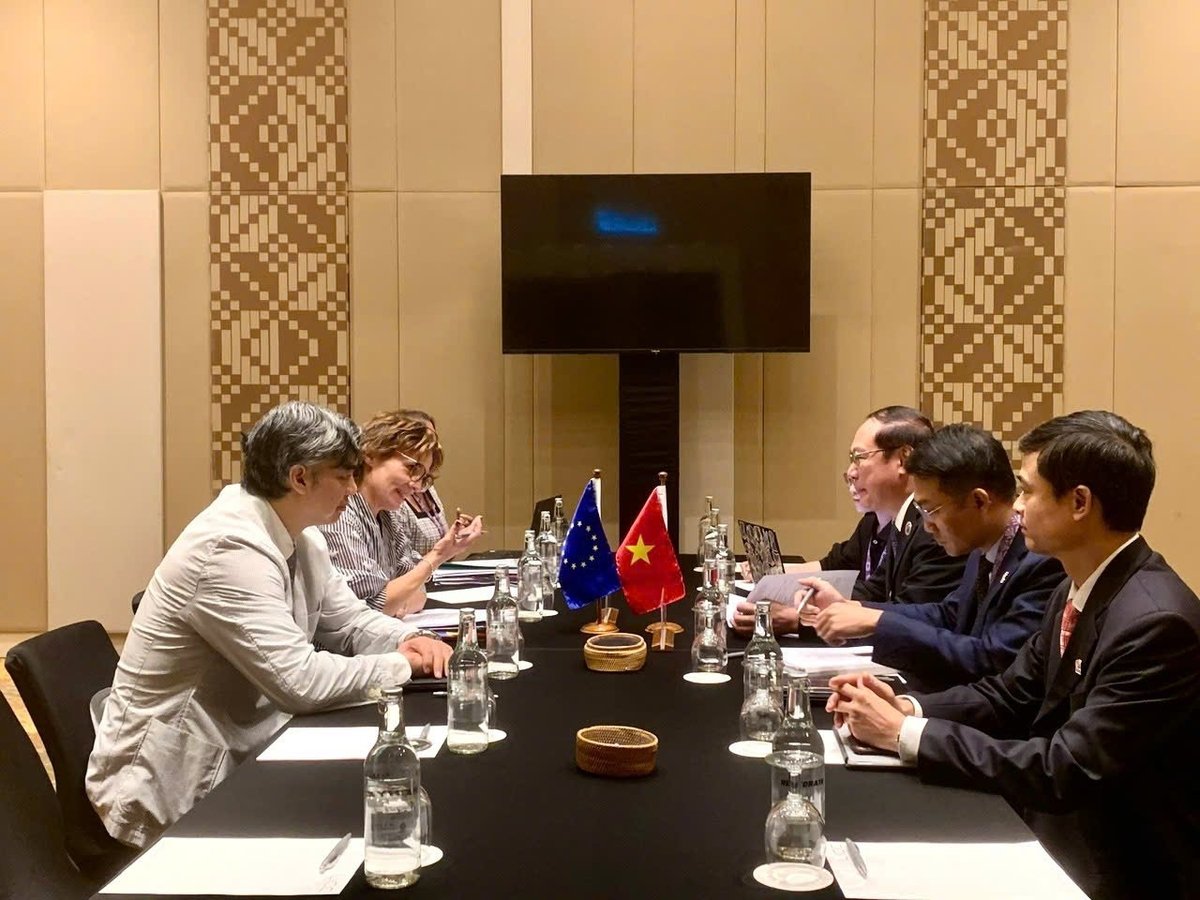
Deputy Minister Le Cong Thanh meets with bilateral partners on the sidelines of the conference (Photo: Thu Uyen)
Deputy Minister Le Cong Thanh underlined that the Ministry of Agriculture and Environment serves as the central agency for designing, coordinating, and monitoring Vietnam’s environmental and climate policies. In this capacity, the Ministry connects domestic strategies with regional cooperation and represents Vietnam’s position at ASEAN and international forums. This role was reflected in the initiatives Vietnam presented at AMME-18, which focused on five key areas of regional cooperation.
First, Vietnam called for enhancing ASEAN’s cooperative mechanisms in line with national strategies. According to Deputy Minister Le Cong Thanh, member states need to align domestic policies with ASEAN’s common goals to ensure commitments move beyond political declarations into substantive actions, supported by clear mechanisms for monitoring, evaluation, and accountability.
Second, he highlighted the importance of knowledge sharing and green technology transfer, particularly in climate-smart agriculture. For a region heavily affected by climate change yet dependent on food security, this is a crucial pathway. Vietnam’s own experience, from water-efficient irrigation, to resilient crop varieties, to circular farming practices, demonstrates how productivity can be sustained while emissions are reduced.
Third, Vietnam urged greater mobilization of green finance and the development of a regional carbon market. Many ASEAN countries face financial constraints in implementing emissions reduction and conservation projects. A common ASEAN framework, the Deputy Minister argued, would enhance access to international support and pave the way for an intra-ASEAN carbon market, a vital economic tool for accelerating climate action.
Fourth, he emphasized the need to strengthen conservation of forests, oceans, and biodiversity, in close connection with international conventions and initiatives such as REDD+. Vietnam has accumulated practical lessons through community forest management, national parks, and marine protected areas — models that show conservation can advance livelihoods while contributing directly to emissions reduction.
Finally, Deputy Minister Le Cong Thanh stressed enhancing the coordinating role of the ASEAN Secretariat to secure a unified regional voice at global forums such as COP and UN conferences. A coherent ASEAN, he argued, would carry more weight in negotiations and strengthen the region’s credibility as a reliable partner in global climate and environmental governance.
Deputy Minister Le Cong Thanh also noted that in the United Nations Sustainable Development Report, Vietnam currently ranks 51st out of 165 countries, climbing 37 places since 2016. This progress, he underscored, reflects Vietnam’s integrated approach to advancing economic growth, environmental protection, and social welfare.
Through its statements and proposals at AMME-18, Vietnam demonstrated a clear linkage between domestic development goals and international commitments. The Ministry of Agriculture and Environment, as the lead agency, signaled Vietnam’s determination to work alongside ASEAN partners in building a greener, safer, and more prosperous community.
Vietnam recognized with 3 ASEAN heritage parks and 2 green city awards
One of the highlights of AMME-18 was the recognition of cities, national parks, and conservation areas with exemplary environmental and sustainability achievements. Vietnam stood out, with three national parks/reserves and two cities receiving prestigious ASEAN environmental awards.
Pu Mat National Park (Nghe An), Cat Tien National Park (Dong Nai), and Xuan Thuy National Park (Ninh Binh) were designated as ASEAN Heritage Parks, reserved for sites with outstanding biodiversity, landscape, and cultural values under effective management and conservation. With these designations, Vietnam now has 10 ASEAN Heritage Parks, among the highest numbers in the region.
In the urban category, Hoa Lư City (Ninh Binh) received the ASEAN Environmentally Sustainable City Award for its efforts in maintaining air quality, waste management, and green infrastructure in connection with the Trang An cultural heritage landscape. Meanwhile, Hai Phong City was presented with a Certificate of Recognition on ASEAN Eco-Challenges, acknowledging its progress in expanding green spaces, water bodies, and ecological integration in urban planning.
These achievements reflect Vietnam’s long-standing policy of integrating conservation with socio-economic development. Over the years, the Ministry of Agriculture and Environment has led the development of a national conservation system, alongside nationwide tree-planting campaigns, plastic waste reduction programs, and eco-urban initiatives. ASEAN’s recognition is not only the outcome of these efforts but also a foundation for strengthening Vietnam’s international standing in environmental management.
Vietnam contributes to strengthening ASEAN’s global role
At AMME-18, Vietnam actively participated in drafting the ASEAN Ministers’ Joint Statement, which emphasized two priority areas: responding to climate change and addressing transboundary pollution, issues directly affecting the region’s economies, societies, and ecosystems.
During discussions, Deputy Minister Le Cong Thanh stressed that national achievements only hold long-term value when embedded in a collective regional framework. He remarked, “The environment knows no borders; isolated efforts are unlikely to succeed without ASEAN cohesion.” This was also the rationale behind Vietnam’s promotion of cross-border programs in tropical forest management, biodiversity corridor conservation, and marine pollution control.
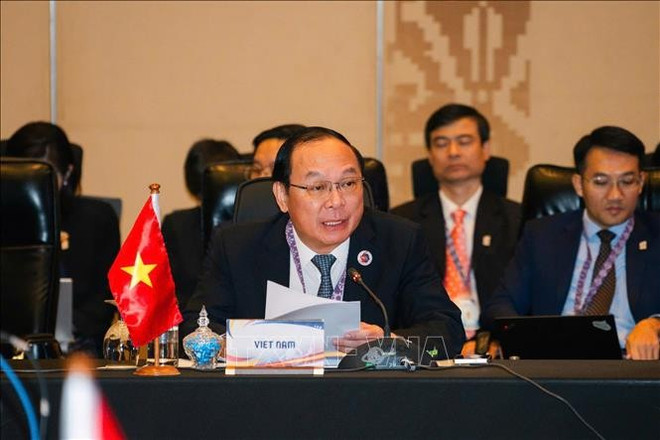
Deputy Minister of Agriculture and Environment Le Cong Thanh addresses AMME-18 and COP-20 AATHP in Langkawi, Malaysia, calling for stronger regional action on environmental protection and highlighting Vietnam’s progress in climate response (Photo: VNA)
Vietnam further proposed the establishment of an ASEAN Green Cities Network. Such a mechanism, according to Deputy Minister Thành, would facilitate the exchange of sustainable urban planning practices while mobilizing investment in green infrastructure, a pressing need for many cities across the region.
Beyond intra-ASEAN initiatives, Vietnam worked with fellow member states to prepare for COP30. Deputy Minister Le Cong Thanh emphasized that a unified ASEAN message would help secure greater access to international finance for both adaptation and mitigation. This view also aligned with Malaysia’s proposal for a Southeast Asia Alliance in global climate negotiations.
Through these contributions, Vietnam underscored its role in strengthening ASEAN’s collective voice. This was not merely about alignment but about positioning Vietnam as a trusted partner in shaping a fairer, more sustainable global environmental order.
Vietnam’s post-AMME-18 orientation: From commitment to action
AMME-18 concluded with tangible outcomes, where Vietnam was prominent both in the recognition it received and in the initiatives it advanced for regional cooperation. The meeting confirmed that environmental issues are no longer domestic concerns alone but vital components of foreign policy, directly tied to national reputation and international responsibility.
For Vietnam, the outcomes of AMME-18 reflected its development orientation enshrined in major policy documents: pursuing green growth, proactively adapting to climate change, and integrating nature conservation with socio-economic progress. The Ministry of Agriculture and Environment once again demonstrated its leadership in coordinating national policies with regional cooperation, ensuring that Vietnam’s voice resonates within ASEAN.
Looking ahead, Vietnam and ASEAN will focus on key priorities: reducing greenhouse gas emissions, managing forests and marine resources, combating plastic pollution, expanding green urban networks, and mobilizing finance for sustainable development. These are areas where Vietnam has practical strengths and seeks to share experiences with regional partners.
More important than statistics or accolades, Vietnam’s presence at AMME-18 conveyed a spirit of partnership, responsibility, and solidarity in tackling shared challenges. The meeting thus marked a milestone affirming that Vietnam is not only acting for itself, but also working for a greener, safer ASEAN for generations to come.
Minh Thao


